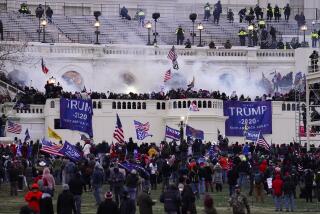Manila Court Kills Indictment of Enrile : Philippines: Charges against 22 others in December coup attempt also ruled invalid.
- Share via
MANILA — The Supreme Court today threw out indictments against Sen. Juan Ponce Enrile and 22 others accused of participating in December’s failed coup, ruling the charges were not valid.
Chief Justice Marcelo Fernan said the justices voted 11 to 2 against reviewing a 1956 court decision, thereby overturning the charges, which combined rebellion and murder. Two justices were absent or abstained, Fernan said.
Enrile and the others faced charges stemming from the Dec. 1-9 coup attempt, in which 113 people were killed. It was the sixth and most serious attempt to overthrow the government of President Corazon Aquino.
In 1956, the court ruled that killings occurring during an armed uprising should be treated differently than crimes with common motives. The court said defendants should be charged simply with rebellion and not murder.
Rebellion is punishable by six to 12 years imprisonment, and defendants are allowed bail. Murder is non-bailable and is punishable by life imprisonment.
Aquino’s legal adviser, Adolfo Azcuna, said the government will abide by the decision but may seek reconsideration. Under Philippine law, Supreme Court rulings become final after 10 days, during which parties to the case can ask for reconsideration.
Justice Secretary Franklin Drilon had said earlier that the government would charge Enrile with rebellion if the court upheld the 1956 decision.
Fernan said the majority believed that there were grounds to prosecute Enrile and the others for rebellion.
Under Philippine law, charges are ordinarily filed after lengthy investigations. It was unclear whether authorities will have to conduct another investigation against Enrile and the others before new charges can be filed.
The government’s decision to indict Enrile and the others on the joint murder-rebellion charge was widely criticized at the time. The late President Ferdinand E. Marcos revived the joint charge during martial law.
In 1987, Aquino canceled the charge, terming it “oppressive.” She then approved its application against Enrile and the others, in an apparent bid to deny them bail.
More to Read
Sign up for Essential California
The most important California stories and recommendations in your inbox every morning.
You may occasionally receive promotional content from the Los Angeles Times.











